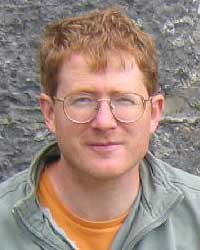Daniel Kennefick Named APS Fellow
By Daniel Kleppner, Forum Vice Chair
 The Forum on the History of Physics congratulates Daniel Kennefick on his appointment as a Fellow of the American Physical Society. He has been honored “for his enthusiastically reviewed book, Traveling at the Speed of Thought: Einstein and the Quest for Gravitational Waves, for his associate editorship of the Einstein papers—to which he brought the skills of physicist and historian—and for his articles, including the diligently researched ‘Einstein versus the Physical Review.’”
The Forum on the History of Physics congratulates Daniel Kennefick on his appointment as a Fellow of the American Physical Society. He has been honored “for his enthusiastically reviewed book, Traveling at the Speed of Thought: Einstein and the Quest for Gravitational Waves, for his associate editorship of the Einstein papers—to which he brought the skills of physicist and historian—and for his articles, including the diligently researched ‘Einstein versus the Physical Review.’”
Kennefick’s interests and writings in the history of physics go back more than a decade to his Caltech doctoral dissertation, which had two parts: a physics thesis on radiation reaction in general relativity, and a historical thesis on the controversies in the history of the radiation-reaction problem. This unusual arrangement has typified his work in history. Most scientists pursuing historical work do so after a long career in research; Kennefick’s youthful combination of the two makes him stand out. His recent book, Traveling at the Speed of Thought (Princeton, 2007) is a notable achievement resulting from his pursuit of history.
As an editor of the Einstein Papers Project (Princeton University Press), he helped to prepare four volumes of the Einstein papers, bringing his scientific and historical research skills to bear on these documents and doing research of the highest order. In this work he made good use of the archives of Howard P. Robertson at Caltech and those of John T. Tate at the University of Minnesota. His mining of these archives has shed light on a number of aspects of Einstein’s personality, culminating in a Physics Today article, “Einstein and Peer Review” (September 2005), which revealed that Einstein did not take kindly to referees, even when he was wrong.
Kennefick serves on the faculty of the University of Arkansas, where he continues to combine his interests in historical research with investigations in general relativity. As an editor of the Einstein Papers Project, now based at Caltech, he continues his work in publishing the collected works of Einstein and in analyzing Einstein’s research papers from the 1920s and 1930s. In recent years, he has conducted extensive oral histories and a sociological study (including over 100 interviews) in the field of gravitational-wave physics, which is expected to inaugurate a new field of gravitational-wave astronomy.
Kennefick’s current research in general relativity and gravitational physics is focused on modeling gravitational waves generated by in-spiraling neutron stars and stellar-mass black holes into super-massive black holes, which probably exist in the centers of galaxies. He is a leading member of a working group of the Laser Interferometer Space Antenna, or LISA, a proposed mission to operate a gravitational-wave detector in space. This group provides theoretical input to the mission’s basic design parameters and specifications, and plans the data analysis. He is also principal investigator on a project planning a census of super-massive black holes in the Universe.
Note Added: This article represents the views of the author, which are not necessarily those of the FHP or APS.
